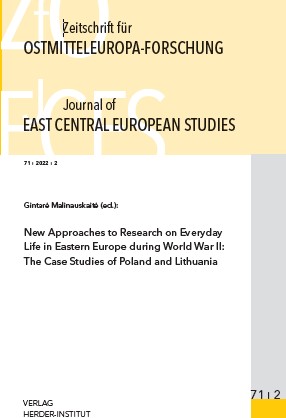“The Sense of Justice and the Need for Eugenics Require Instant and Effective Intervention”: Terminating Pregnancies Resulting from Wartime Rapes in Poland in 1945
“The Sense of Justice and the Need for Eugenics Require Instant and Effective Intervention”: Terminating Pregnancies Resulting from Wartime Rapes in Poland in 1945
Author(s): Jakub GałęziowskiSubject(s): Military history, Criminology, Studies in violence and power, Victimology, WW II and following years (1940 - 1949), Fascism, Nazism and WW II
Published by: Verlag Herder-Institut
Keywords: war rape; wartime sexual violence; abortion; biopolitics; Polish Red Cross; children born of war; post-war Poland;
Summary/Abstract: In the final months of the World War II and the first months after that conflict’s end, millions of Red Army soldiers passed through Poland in both directions. They not only participated in military actions but also frequently committed crimes against the civilian population. The sexual violence they perpetuated affected not only local women who lived in former territories belonging to the Third Reich (so-called autochthons), but also Polish women—former forced laborers and ex-prisoners of concentration camps returning to their homes after the war and displaced women from the Kresy Wschodnie (eastern borderlands) who migrated to the western territories. These rapes led to the spread of venereal diseases and many unwanted pregnancies. As a result, from June to November 1945, an exception was introduced which made it possible to legally terminate those pregnancies which were the result of so-called war circumstances. Based on the preserved archival documents, it is impossible to estimate the number of abortions, but judging by the secret appeal of the communist authorities from October 1945, it must have been enormous: doctors were advised to exercise “considerable restraint” in directing women to treatments, given the “the demographic needs of a war-devastated country.” Ultimately, therefore, the concern for demographic loses and resulting pro-natalist policies won out over the need for “eugenics” and any “sense of justice.” The article discusses issues of post-war biopolitics that have not yet been explored in Polish historiography.
Journal: Zeitschrift für Ostmitteleuropa-Forschung
- Issue Year: 71/2022
- Issue No: 2
- Page Range: 235-260
- Page Count: 26
- Language: English

